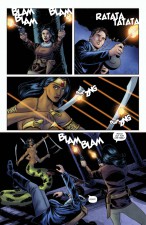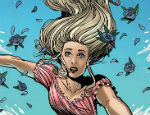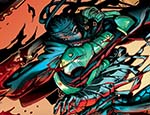
Athena Voltaire first soared into our imaginations over a decade ago, as one of a handful of those newfangled “webcomics”. However, Steve Bryant’s exciting and vivacious adventuress was more than just a pretty face, and the strip itself was of such a high quality that it garnered an Eisner nomination in 2005.
 On December 10 this year, Bryant and his partners at Dark Horse Comics are reissuing all of the aviatrix’s high-flying adventures in The Athena Voltaire Compendium. Just in time for the holidays, folks!
On December 10 this year, Bryant and his partners at Dark Horse Comics are reissuing all of the aviatrix’s high-flying adventures in The Athena Voltaire Compendium. Just in time for the holidays, folks!
More than just a collection, this massive tome also launches Ms. Voltaire into the imaginations of a new wave of readers, with a retooled backstory and stunning new pages courtesy of Steve himself.
Ms. Voltaire’s humble creator took some time away from his busy work schedule to discuss her roots in pulp tradition and modern pop culture, and why now is the perfect time to reintroduce his creation to the world.
Athena Voltaire was one of the earliest webcomics to receive mainstream industry recognition, garnering a coveted Eisner nomination. As one of the pioneers of online comics, what are the biggest changes you’ve noticed since first publishing Athena Voltaire in 2002?
Steve Bryant: I’m definitely not a pioneer – there are plenty of creators who were there before I was and managed to build careers solely as webcomickers. They’re the real pioneers. Me? I was just in the right place at the right time.
That said, the biggest change is the acceptance that webcomics are now getting. Back when I was actively doing AV online, maybe one in ten reviewers would respond to my query letters.
Even then, it wasn’t a slam dunk that they’d be interested in reviewing a webcomic. I remember one guy responding that he only reviewed “real” comics; in other words, he only reviewed print comics. His reviews only appeared on a website – not in print – but I don’t think he saw the irony in his statement.
Today, webcomics have exploded. The question of whether or not they’re “real” comics isn’t even discussed.
 Would you say it’s easier or harder in today’s climate to publish online successfully?
Would you say it’s easier or harder in today’s climate to publish online successfully?
Easier. The stigma’s gone, and audiences today know the drill. Sure, there are more webcomics than ever, but social media has exploded, making it a lot easier to introduce your work to new readers.
How have crowdfunding platforms like Kickstarter changed your approach to publishing? Do you think this is a model that will be able to sustain itself?
In the past few years, Kickstarter has evolved into a cool way to pay for printing with a direct preorder-style system. There are still campaigns to fund the creation of a book, for sure, but it seems like the majority of the successful campaigns are launched to publish completed work.
I’d love to try a Kickstarter again in the future, but would want to have the work completed before launching it. As long as there’s good work to publish, I can’t see why it wouldn’t be self-sustaining.
Why was now the right time to revisit Athena’s backstory? What was the hardest thing to change? What was the easiest?
My collaborator left and took his contributions with him. If I wanted to continue with the character, I needed to flesh out her history before producing new material.
 The hardest thing to change was rescripting the existing artwork in the Compendium. I really underestimated what an enormous undertaking it would be!
The hardest thing to change was rescripting the existing artwork in the Compendium. I really underestimated what an enormous undertaking it would be!
Who knew that writing a couple hundred pages of comics, drawing 50 entirely new pages and countless patches for existing artwork would be so time-consuming? Not me, apparently.
The easiest thing to change, surprisingly, was her backstory. I hit upon the idea of Athena’s father as a stage magician almost immediately after deciding to relaunch. From there, the rationale for her skill set and everything else pretty much fell into place.
There’s a surprisingly fine line between fact and fiction when it comes to the Nazis and the occult world. What is your favorite piece of occult Nazi lore that readers might not be aware of? Why does this subject matter continue to fascinate us decades later?
The whole concept of the Hollow Earth and the Vril-Ya, the supermen who lived within, is easily my favourite!
Alexandre Saint-Yves d’Alveydre originated the concept in his 1885 book The Kingdom of Agarttha: A Journey into the Hollow Earth. Members of the Vril Society are said to have included Adolf Hitler, Alfred Rosenberg, Heinrich Himmler, and Hermann Göring,
It’s fascinating in the way that Bigfoot and the Loch Ness Monster will always be fascinating. It’s impossible, but on some level, like Fox Mulder, all of us want to believe.
Athena is a great example of an empowered female protagonist. Who were some of the strong women, fictional or actual, that inspired her creation, and did that change when you decided to revisit the material?
 Athena Voltaire certainly owes a lot to the heroines created by James Cameron and Joss Whedon. Sarah Connor, Ellen Ripley, Buffy Summers, and Zoë Washburne’s fingerprints are all over modern pop culture.
Athena Voltaire certainly owes a lot to the heroines created by James Cameron and Joss Whedon. Sarah Connor, Ellen Ripley, Buffy Summers, and Zoë Washburne’s fingerprints are all over modern pop culture.
Lots of comic influences there, too, like Valkyrie from Airboy, the Dragon Lady from Terry and the Pirates, the Flyin’ Jenny comic strips by Russell Keaton, Doc Savage’s sister, Pat Savage…
I’m sure there are more that I’m forgetting.
There is a very direct tie to pulp tradition in Athena Voltaire. What sets her apart from other pulp heroines?
I love the period, so I’m consciously trying to embrace other cool genres from it. I imagine the banter with a similar cadence as the Thin Man movies, except with Athena delivering the William Powell lines. I’d like to bring in more and more elements of film noir and screwball comedy, in addition to the lost cities and ancient artifacts.
Why is Athena relevant to modern audiences?
A friend of mine once summed up what drives adventure fiction: compelling characters in extraordinary situations. That mission statement is pretty timeless, so I’m doing my best to deliver on it.
As mentioned, The Athena Voltaire Compendium is published by Dark Horse Comics on December 10. As a preview, a pulptastic 32-page story, Athena Voltaire and the Feathered Serpent, is available to download for free from the Dark Horse site.
To find out more about Steve and his work, visit his website.















Thanks for taking the time to chat about the book, Jason! I’d like to clarify that Athena Voltaire is published through the Sequential Pulp imprint at Dark Horse—who also produced Tim Conrad’s Hunchback of Notre Dame adaptation and the upcoming Jungle Tales of Tarzan collection. It’s a fantastic imprint headed up by Michael Hudson, without whom, the AV Compendium wouldn’t exist.
[…] Jason Wilkins at Broken Frontier talked to me about webcomics, Kickstarter, Athena Voltaire’s history, influences and future. A good time! There’s some preview art there, too. […]